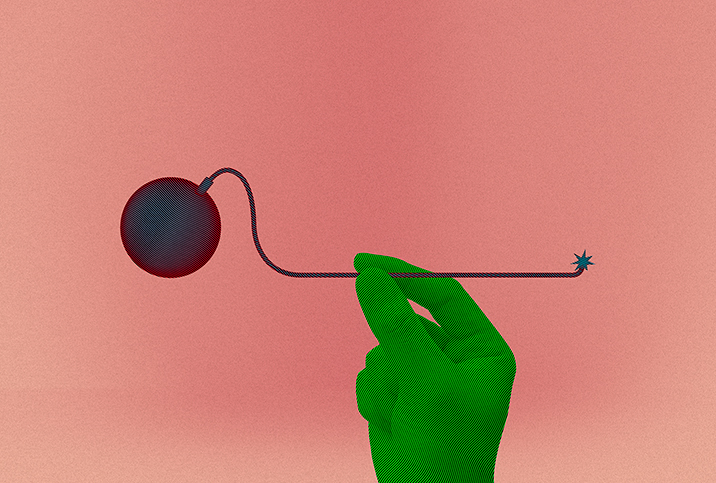Could a Chronic Condition Be Causing Your Premature Ejaculation?

Whether for conception or for pleasure, the act of ejaculation—and its attendant but separate companion, orgasm—is one many men both treasure and take for granted. It just happens as it should, unless it doesn't: too soon, too late or not at all.
Premature ejaculation (PE)—when a man comes sooner than he or his partner desires—is the most common type of male sexual dysfunction, according to the American Urological Association. Data from the National Health and Social Life Survey indicated that about 1 in 5 men between the ages of 18 and 59 will experience PE.
While anxiety, depression, stress and other psychological factors are often thought to cause a man to finish too quickly, some research indicates chronic physical conditions may play a role, as well.
Persistent pelvic pain and premature ejaculation
A study published in the Journal of Sexual Medicine looked at 8,261 men with a median age of 50.4 and evaluated the relationship between chronic prostatitis/chronic pelvic pain syndrome and PE. After adjusting for age, testosterone level, metabolic syndrome and International Index of Erectile Function score, the odds ratio for PE significantly increased with the severity of pelvic pain.
Chronic prostatitis can contribute to PE, but it can cause a host of other issues, as well, noted Neel Parekh, M.D., a clinical assistant professor of urology at the Cleveland Clinic Foundation. While he hasn't heard patients with prostatitis complain about PE specifically, they have noted pain with ejaculation. Men with prostatitis are also less likely to pursue sexual activity because of the discomfort they're experiencing.
Laurence Levine, M.D., a professor of urology at Rush University Medical Center in Chicago, explained that the hypersensitivity in the genital region associated with chronic prostatitis could be a factor in ejaculation.
"A general sense of irritability might activate a more accelerated ejaculatory reflex," Levine said.
Diabetes and premature ejaculation
The association between diabetes and PE is being investigated, too. A study in Translational Andrology and Urology found PE is more prevalent in patients with diabetes compared to men without diabetes. The patients with diabetes reported a higher incidence of PE with increased severity of erectile dysfunction (ED).
However, researchers acknowledged the underlying mechanism of the association is poorly understood.
Thyroid disease and premature ejaculation
Another chronic condition associated with PE is hyperthyroidism, or overactive thyroid. One doctor noted that some of his patients with thyroid disease experienced difficulty with ejaculation—either coming too soon or after far too long.
"For the most part, guys who have poor thyroid function or hypothyroidism typically have delayed ejaculation, and those guys that have hyperthyroidism typically suffer from premature ejaculation," said Darshan Patel, M.D., an assistant professor of urology at the University of California San Diego Health.
However, the mechanism behind why thyroid disease is associated with PE—and erectile dysfunction, for that matter—is not fully understood.
Levine said he doesn't know why hyperthyroidism would have a higher association with PE.
"My suspicion is that was something that was historically reported and it keeps on getting carried forward," Levine said. "I don't know why a hyperthyroid person would be more apt to have premature ejaculation at all, frankly."
Premature ejaculation is not fully understood
One of the theories about PE is that there's hypersensitivity at the penile level, Levine noted.
"The nerves of stimulation are, in a sense, hypersensitive, so they send a much stronger signal to the brain, which then activates the ejaculatory reflex," Levine said. "There's also the central nervous system theory: No matter what the message is that's coming in from the penis, the response centrally is accelerated and, therefore, triggering the ejaculatory reflex."
"It's complicated," said Andrew Cohen, M.D., director of trauma and reconstructive urologic surgery at Johns Hopkins Bayview Medical Center in Baltimore, adding that the exact causes of premature ejaculation are not fully understood. "It's some combination of psychological, behavioristic and biogenic, but there is no known universal cause for this."
Cohen added that all sexual experiences are on a spectrum, including the experience of orgasm.
"It's really hard to define when one person's normal starts and another person's abnormal begins," he said. "Is that just part of human experience? Or is there an actual disease process going on there? That's a challenging question."
ED leading to PE
It's important to differentiate the type of PE the man has and whether it's a lifelong condition or an acquired one, said Petar Bajic, M.D., a urologist in the Center for Men's Health in the Glickman Urological & Kidney Institute at the Cleveland Clinic.
In a majority of acquired PE cases, Bajic said, the most common cause is erectile dysfunction. The hypothesis for why this happens is that the man's brain will try to orgasm more rapidly before the erection softens. It's a vicious cycle where the worse the erections are, the shorter the latency time until ejaculation.
Therefore, anything that causes ED—high blood pressure, high cholesterol, diabetes—may be more likely to lead to premature ejaculation. Acquired PE "definitely" has an association with other medical problems, Bajic explained.
A study in the International Journal of Impotence Research looked at the relationship between acquired PE and obesity, a chronic disease that contributes to many other chronic illnesses and is associated with ED. The researchers found that the men in the study with a waist measurement greater than 40 inches were more than three times as likely to suffer from PE.
In addition to obesity, PE can also be associated with a hormonal imbalance.
"Low testosterone is definitely associated with other major medical conditions, like diabetes, sleep apnea, all sorts of different stuff," Bajic said. "Anything that can lower the testosterone, or at least be associated with that, can then also be associated with premature ejaculation."




















